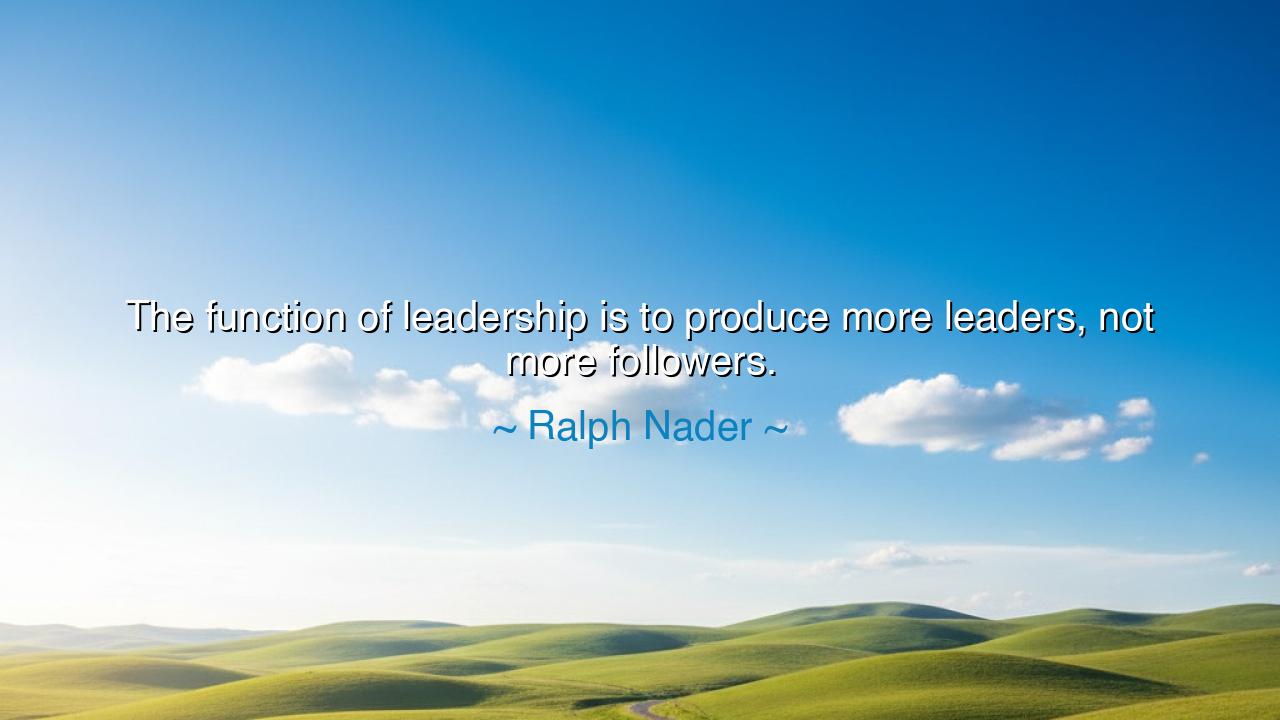
The function of leadership is to produce more leaders, not more






Hear, O children of truth and heirs of tomorrow, the words of Ralph Nader, a voice of conscience in the age of power: “The function of leadership is to produce more leaders, not more followers.” In these words lies a commandment as old as civilization itself — that the highest duty of a leader is not to gather worshippers, but to awaken greatness in others. The true leader does not seek to be served, but to serve; not to command obedience, but to cultivate wisdom and courage in those who walk beside him. For leadership that breeds dependency dies with the man; leadership that breeds empowerment endures through generations.
Nader, known for his lifelong battle against corruption, corporate greed, and complacency, understood this truth through struggle and perseverance. In his pursuit of justice, he inspired a movement of reformers, activists, and thinkers — not by commanding them to follow, but by teaching them to stand. His words remind us that the function of leadership is not to hoard authority, but to distribute it; not to be the sun around which others revolve, but the spark that ignites a thousand flames. For a true leader measures his greatness not by how many serve him, but by how many he has made capable of serving others.
The ancients, too, spoke of this sacred duty. Confucius, the sage of China, taught his disciples not merely to obey his wisdom, but to embody it — to live as men of virtue, that they might guide others when he was gone. And so it was with Socrates, who asked questions not to be admired, but to awaken thought in those around him. Both knew that a people who depend solely on one wise man will perish when he is gone, but a people taught to think and lead will endure forever. Thus, the function of leadership is not dominance, but legacy — to plant seeds of insight in the hearts of others, so that wisdom may bloom anew with every generation.
Look, too, to the life of Nelson Mandela, who spent twenty-seven years in prison and yet emerged not bitter, but radiant with purpose. He could have ruled as a hero, demanding worship for his sacrifice. Instead, he chose humility — mentoring others, sharing power, building a nation of leaders rather than followers. He once said, “It is better to lead from behind and put others in front, especially when you celebrate victory.” Through his example, he taught his people not to depend on him, but to depend on themselves, to carry forward the torch of freedom even after his light was gone. Such is the mark of real leadership — it outlives its bearer.
O listeners, remember this eternal truth: the tyrant craves followers, for he fears the strength of independent minds. But the wise leader delights in strong companions, for he knows that his own power is multiplied when others rise beside him. The leader who demands blind obedience builds a prison of fear; the one who teaches self-reliance builds a kingdom of wisdom. A nation, a family, or an organization thrives not when one commands, but when all contribute — each voice strong, each spirit awake. To lead, then, is not to control others, but to release them into their own greatness.
And yet, this path requires humility. To produce leaders is to accept that one day they may surpass you. The insecure cling to control; the wise rejoice when others excel. The great mentor rejoices to see his students rise higher than himself, for in their ascent he fulfills his purpose. As Lao Tzu wrote: “When the best leader’s work is done, the people will say, ‘We did it ourselves.’” Thus, the truest sign of leadership is not authority, but absence — when the teacher’s presence is no longer needed because his students have become teachers themselves.
So, my children of the future, learn from this wisdom: if ever you find yourself in a place of influence — whether over one or over many — remember that your task is not to shine alone, but to kindle light in others. Teach what you know. Share your strength. Encourage others to lead where you have led. Do not build a throne; build a circle. For the leader who creates followers may achieve glory, but the leader who creates leaders achieves immortality.
Let the words of Ralph Nader echo through your days: the function of leadership is to make others capable of greatness. Be that teacher, that mentor, that guide who lifts others to their full height. And when you see them surpass you, rejoice — for in their rising, your own light will not fade, but multiply. For the truest power is not in commanding others, but in setting them free to lead.






AAdministratorAdministrator
Welcome, honored guests. Please leave a comment, we will respond soon